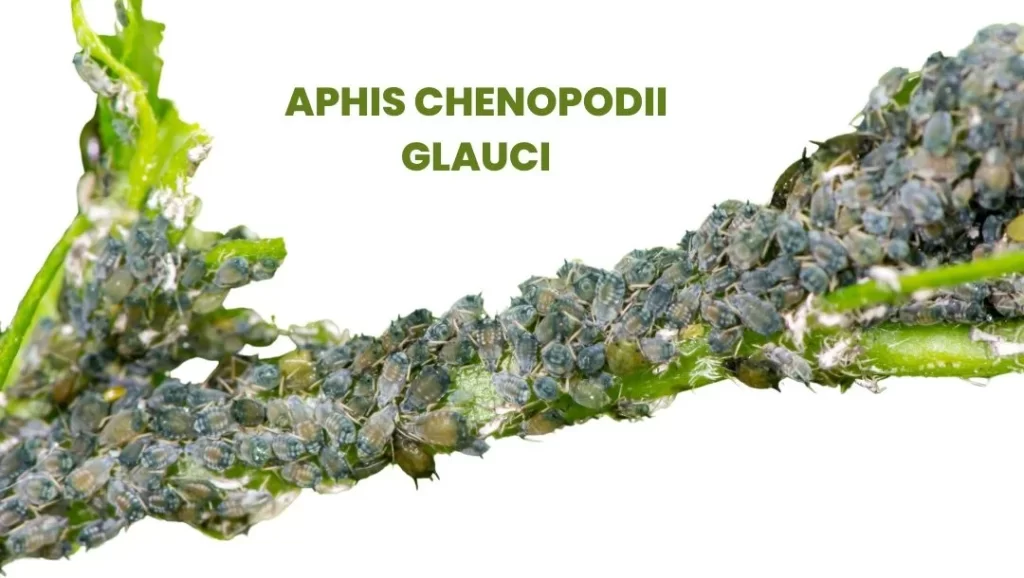Aphis Chenopodii Glauci, commonly referred to as plant lice from Chenopodium, is a homeopathic remedy that derives its therapeutic properties from the insects that live on the Chenopodium plant.
In homeopathy, substances like these are believed to carry the energetic properties of the host plant through the interaction between the insect and plant.
This remedy is indicated for a variety of conditions, especially neuralgias (nerve pains), digestive issues, and ailments involving the head and face.
The key areas of action include the digestive tract, urinary system, and musculoskeletal pain, particularly in the back.

SOURCE INFORMATION
Scientific Classification
- Kingdom: Animalia
- Phylum: Arthropoda
- Class: Insecta
- Order: Hemiptera
- Family: Aphididae
- Genus: Aphis
- Species: Aphis Chenopodii Glauci
Origin and Historical Facts
- This remedy is prepared from the lice found on Chenopodium (goosefoot) plants, commonly known for their bitter properties.
- The idea of using the aphid in homeopathy emerged from the theory that the insect embodies the therapeutic effects of the plant it consumes.
- Chenopodium itself has long been used for its healing benefits, especially in traditional medicine for digestive and nervous system issues.
- Homeopathy took this interaction a step further, using the insect to concentrate and amplify the plant’s properties into an energetic medicine.
DRUG PATHOGENESIS
- The primary action of Aphis Chenopodii Glauci is observed in cases where there are neuralgic pains, especially those affecting the head and face, accompanied by digestive disturbances.
- It also targets urinary symptoms, back pains, and feverish conditions.
- The remedy acts by addressing both physical and emotional complaints, especially when related to suppressed feelings or chronic irritation.
PHYSICAL CONSTITUTION
- Individuals needing this remedy are often of a nervous constitution, prone to digestive upsets and neuralgic pains.
- They might experience alternating symptoms such as constipation and diarrhea, and a general tendency toward muscle stiffness, especially in cold weather.
DIATHESIS
- The patients who benefit from Aphis Chenopodii Glauci may have a tendency toward chronic neuralgias, recurring digestive problems, and urinary discomfort.
- Their complaints often follow exposure to cold, emotional stress, or after periods of overwork.
TEMPERAMENT
- The temperament of these individuals is typically melancholic or anxious.
- They tend to feel sadness or discouragement, especially when dealing with persistent physical discomfort.
- Restlessness, irritability, and a sense of unease are common psychological characteristics.
KEY CHARACTERISTICS
- Neuralgic Pains: Especially affecting the right side of the head, extending to the cheek, jaw, and ear.
- Digestive Issues: Loss of appetite, especially for meat and bread, with rumbling in the abdomen and colic.
- Urinary Symptoms: Burning in the urethra, frequent and copious urination, with frothy appearance.
- Musculoskeletal Pains: Sharp pain near the left shoulder blade, radiating to the chest.
- Feverish Sensations: Chills and shuddering, along with burning sensations in the palms and excessive sweating at night.
DETAILED ORGAN SYMPTOMS
HEAD
- Individuals experience sadness and mental dullness, with headache worsened by motion.
- There may be an uncomfortable sensation in the brain as though it is being moved about, with associated neuralgia, particularly around the right eye and face.
NOSE
- Coryza (inflammation of the nasal mucous membrane) with burning in the nostrils.
- There can be a noise in the ears like cannon fire, indicating congestion or pressure in the head.
FACE
- Pain extending from the teeth to the temple, ear, and cheekbones.
- Profuse tearing and neuralgic pain on the right side of the face are prominent symptoms.
DIGESTIVE SYSTEM
- Individuals have a loss of appetite for meat and bread, with frequent colic and rumbling sounds in the abdomen.
- Constipation with hard, knotty stools is common, though some may experience morning diarrhea with burning pain in the anus and pressure in the rectum.
URINARY SYSTEM
- Patients may suffer from frequent, copious urination with a burning sensation in the urethra.
- The urine is often frothy, suggesting inflammation of the urinary tract.
MUSCULOSKELETAL SYSTEM
- Sharp, severe pain is often felt in the lower part of the left shoulder blade, radiating into the chest. This is usually aggravated by cold or physical exertion.
FEVER
- Fever symptoms include shuddering throughout the body, burning in the palms, and night sweats in bed.
MODALITIES
- Worse: From motion, cold air, and cold exposure.
- Better: From warm, dry environments and general warmth.
RELATIONSHIP WITH OTHER DRUGS
- Antidotes: Natrum Sulphuricum, Nux Vomica.
- Compare with: Chamomilla for toothache, Plantago for neuralgia extending to the ears, Natrum Sulph for neuralgias and digestive issues.
DOSE
- The remedy is typically given in the 6th to 30th potency.
- It is administered depending on the severity of the symptoms and the patient’s constitution.
- Lower potencies are used for acute conditions, while higher potencies are reserved for more chronic issues.
Frequently Asked Questions
Can Aphis Chenopodii Glauci help with chronic headaches?
- Yes, it is particularly helpful for neuralgic headaches, especially those associated with a burning sensation in the nostrils or pain extending to the face and jaw.
Is this remedy suitable for digestive issues?
- Yes, it can be beneficial for those suffering from colic, rumbling in the abdomen, and alternating constipation and diarrhea, especially when triggered by cold or emotional distress.
How should Aphis Chenopodii Glauci be taken?
- It is usually taken in the 6th to 30th potency, with dosages adjusted based on the severity and chronicity of the symptoms.
- Consult a homeopath for specific guidance.
Glossary of Difficult Words
- Neuralgia: Intense, sharp nerve pain.
- Coryza: Inflammation of the mucous membranes in the nose, usually causing a runny nose.
- Micturition: The act of urinating.
- Colic: Severe, fluctuating pain in the abdomen caused by intestinal gas or obstruction.
- Frothy: Bubbly, foamy.
- Palmar: Related to the palm of the hand.
This guide presents the comprehensive profile of Aphis Chenopodii Glauci, emphasizing its homeopathic applications and addressing common conditions associated with its use.
